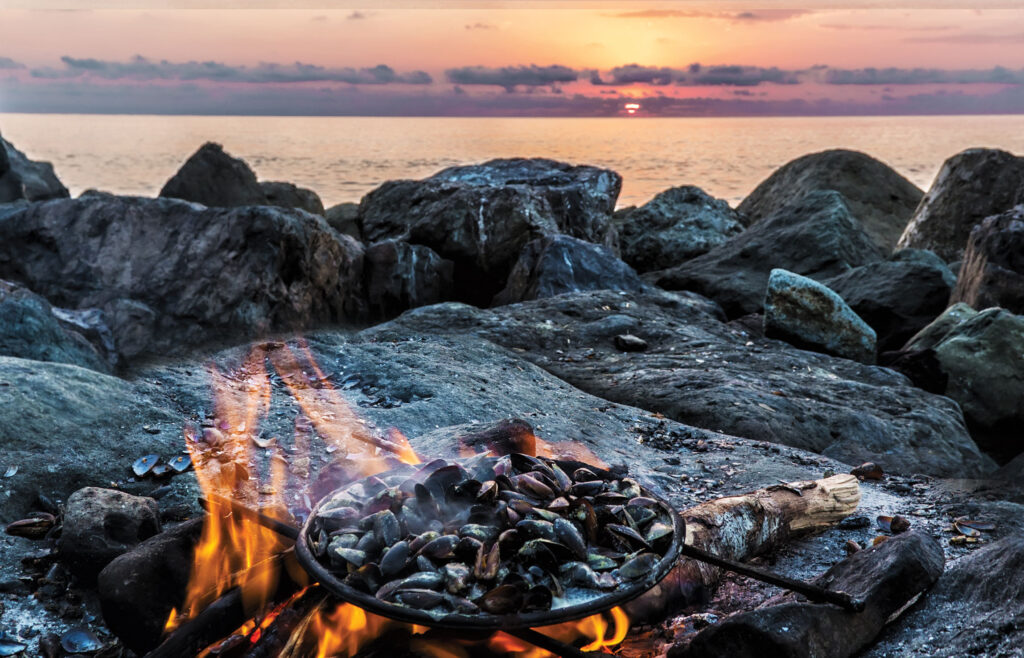Advertisement
Outdoor Eats
Roughing it never tasted so good

After a long, long winter, many Canadians are once again itching to get outdoors and escape into the wilderness. And whether that is an adventure to the coast, a foray to a cabin in the mountains, or a road trip to your favourite national park to celebrate Canada 150, healthy camping recipes will be needed to fuel any active outdoor pursuit. Besides, somehow food just tastes better when you’re soaking up Mother Nature.
But campfire or cabin food can be so much more than instant oatmeal, PB&J, and canned beans. With a little bit of forethought and taking advantage of locally available foods, you can rustle up fuss-free, more sophisticated meals that prove eating to the sound of crashing waves or among towering trees can be deliciously gourmet. After all, who says you can’t feel like a rockstar chef with dirt underfoot?
Turn up the camp stove or light your fire. These healthy camping recipes are an irresistible matchup of great taste and energizing nutrition. Psst … they’re just as good when prepared and served in the comfort of your very own kitchen.
Advertisement
Healthy camping recipes
Crunch Bunch
Granola Yogurt Bowl with Stewed Rhubarb
Miso Shellfish Soup
Halloumi and Fire Roasted Pepper Salad
Campfire Chili
Asparagus Shakshuka with Chickpea Flatbreads
Backcountry cookery
Great meals in the rough should balance the need for convenience, great flavour, and nutrient-dense foods that enable you to push farther along the trail. These tips can help you nail this trifecta.
Plan ahead
The key to making your camp meals as seamless as possible is to plan out your meals and snacks well before lighting the first fire. That way, you can pack up the necessary ingredients at home that aren’t readily available from rural stores. And if you’re not wired up, be sure to print out a copy of your recipes.
Downgrade
Items such as oils and spices can be transported in smaller containers in pre-portioned sizes. When a recipe like chili calls for multiple spices, consider mixing them together ahead of time so they are ready to go. Even some vegetables, such as carrots, can be pre-chopped.
Forage along the way
Make it a point to source some of your ingredients en route to your destination. This can include a pit stop at a farm stand for seasonal greens and fruits; a side trip to a local farm for organic grass-fed beef, free-range eggs, or cheese; and a visit to a local winery or craft brewery. Of course, if you’re sea bound, be sure to take advantage of any fresh catches from local fishermen.
Go with the flow
Yes, it’s a good idea to have some recipes in hand, but no, you shouldn’t be a slave to them. You want to allow for some spontaneity based on any exciting edibles you may come across. So that could mean using fresh locally shelled peas instead of asparagus in the shakshuka recipe or swapping out beef for organic free-range chicken in a pot of chili. After all, venturing into the wilderness should also mean escaping the anchors of everyday life.
Chill out
Perishables such as yogurt and meats need to be transported in a cooler that is kept chilled with plenty of ice. Always keep the temperature inside your cooler at or below 40 F (4 C). Leftovers such as chili can be kept in a cold cooler for a day or two.
Tool of the trade
A sturdy cast iron skillet is a camp workhorse, as it can be used to make everything from a quick granola to freshly caught fish and will hold up beautifully when set over an open flame. A cast iron Dutch oven performs like a pro over a campfire (and gives you a bit of an upper body workout). Also make sure you have packed up any tools—such as knives, can openers, and cutting boards—that are necessary to make the recipes you have in mind.












